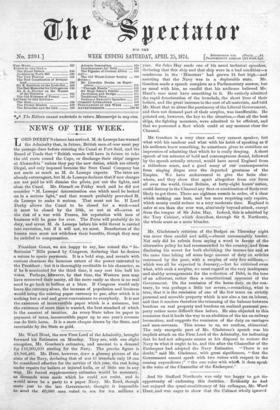Mr. Gladstone's criticism of the Budget on Thursday night was
more than candid and mild,—almost unreasonably tender. Not only did he refrain from saying a word in favour of the alternative policy he had recommended to the country, and-from disclosing his secret for both abolishing the income-tax and at the same time taking off some large amount of duty on articles consumed by the poor, with a surplus of only five millions,— which was all he expected in January,—but he criticised even what, with such a surplus, we must regard as the very inadequate and shabby arrangements for the reduction of Debt, in the tone of an adherent, rather than a constitutional opponent of the Government. On the remission of the horse duty, on the con- trary, he was perhaps a little too severe, —remarking, what is true, that it is the remission of one of the few taxes on strictly personal and movable property which is not also a tax on labour, and that it renders therefore the trimming of the balance between burdens on real property and burdens on realised personal pro- perty rather more difficult than before. He also objected to this remission that it leads the way to an abolition of the tax on railway locomotion, and suggests the remission of the duty on carriages and men-servants. This seems to us, we confess, chimerical. The only energetic part of Mr. Gladstone's speech was his implicit attack on the First Lord of the Admiralty, for indicating that he had not adequate means at his disposal to restore the Navy to what it ought to be, and this after the Chancellor of the Exchequer had adopted the Navy Estimates. "There is no doubt," said Mr. Gladstone, with great significance, "that the Government cannot speak with two voices with respect to the coming expenditure ;" " the one voice with whidh it does speak is the voice of the Chancellor of the Exchequer."


































